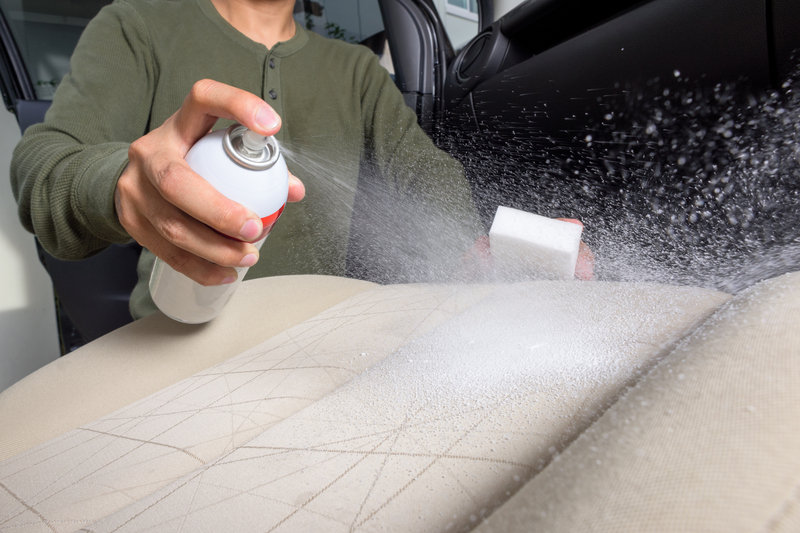Practical Solutions to Tackle Dampness Smell
Posted on 26/08/2025
Practical Solutions to Tackle Dampness Smell
If you've ever walked into a room and been greeted with a musty, unpleasant odor, you know just how disruptive dampness smell can be to your home's freshness and comfort. Whether it's a basement, bathroom, garage, or even clothes fresh from the laundry, that unwelcome smell can linger for days or even weeks. Fear not! With the right strategies and consistent efforts, you can successfully combat musty dampness odors and restore a clean, fresh environment. In this comprehensive guide, we explore practical solutions to tackle dampness smell, why it happens, and actionable tips for eradicating and preventing it for good.

Understanding the Causes of Dampness Smell
Before diving into solutions, it's important to understand what causes the dampness odor in the first place. The smell commonly associated with damp environments is typically produced by mold and mildew, microscopic fungi that thrive in humid conditions.
Key Causes of Musty Dampness Smells:
- Poor ventilation leading to excess humidity
- Leaks or water intrusion from roofs, walls, or plumbing
- High humidity levels, often above 60%
- Condensation on cool surfaces
- Wet or damp fabrics left unattended
- Inadequate insulation causing cold surfaces to attract moisture
Why address the smell? Beyond being unpleasant, persistent dampness odor may indicate hidden water damage or even structural problems. If left untreated, it can pose health risks, such as triggering allergies or respiratory issues.
Step-by-Step Solutions for Removing Dampness Smell
1. Identify and Eliminate the Source of Moisture
- Inspect for visible leaks or water stains on ceilings, walls, and floors. Repair any leaks immediately as continual moisture feeds mold growth.
- Check under sinks, behind appliances, and around plumbing fixtures, as sneaky leaks can go unnoticed.
- Inspect windows for condensation or faulty seals which can let in moisture and contribute to damp smells in rooms.
- Don't forget to check less obvious areas--behind furniture, in storage boxes, or even under wallpaper and carpets.
2. Improve Ventilation
- Open windows and doors regularly to promote airflow. Fresh air helps reduce musty odors by lowering indoor humidity.
- Use exhaust fans in kitchens and bathrooms. If your home lacks proper exhaust, consider installing or upgrading fans for greater efficiency.
- Set up oscillating fans or box fans to circulate air in stagnant or enclosed spaces.
- If feasible, utilize window air conditioners or dehumidifiers to remove excess moisture from the air.
3. Deep Clean and Dry Affected Areas
- Remove all items from areas affected by the dampness smell. Clean shelves, floors, and walls with a mixture of water and mild detergent.
- For severe odors, add a small amount of white vinegar to your cleaning solution. Vinegar is a natural deodorizer that can help neutralize musty smells.
- Wash fabrics, linens, curtains, and clothing in hot water. Add a cup of baking soda or vinegar to your laundry for an added boost in eliminating odor.
- For carpets and upholstery, sprinkle baking soda, let sit for several hours, then vacuum thoroughly.
- Discard items that remain moldy or damp-smelling after cleaning, especially if they are porous and difficult to sanitize.
4. Absorb Moisture with Dehumidifiers and Desiccants
- Invest in a quality dehumidifier for rooms most susceptible to high humidity. This can drastically reduce the conditions that cause dampness and smell.
- Place moisture absorbers, like silica gel packs, activated charcoal, or commercially available desiccant products, in closets, basements, and cupboards.
- Regularly empty and clean dehumidifier water reservoirs to prevent mildew buildup.
- Tip: DIY moisture absorbers made from baking soda or rock salt in open containers can also help control minor damp issues.
5. Neutralize Odors with Natural Remedies
- Set out bowls of coffee grounds, activated charcoal, or baking soda in musty rooms to absorb lingering odors naturally.
- Use essential oils, such as tea tree, eucalyptus, or lavender, which have antimicrobial properties and help freshen the air.
- Simmer a pot of citrus rinds and cloves on the stove to infuse the air with a clean, refreshing scent.
- Tip: Always avoid masking odors with artificial fragrances, as these may temporarily hide, not eliminate, the underlying problem.
6. Address Persistent Mold and Mildew
- For minor mold patches (less than 10 square feet), scrub hard surfaces with a solution of 1 cup bleach per gallon of water. Always ventilate the area during cleaning and wear gloves.
- For extensive, recurring, or hidden mold (inside walls, HVAC systems, or insulation), consult a professional mold remediation specialist.
- Replace mold-infested drywall, ceiling tiles, or carpets when the damage is significant and cleaning isn't effective.
Long-Term Prevention Tips for Dampness Odor
Eliminating a dampness smell is only half the battle--preventing its return should be your next goal. Here's how to ensure your home remains fresh and free of musty odors:
Control Indoor Humidity
- Keep humidity levels below 50% with the use of dehumidifiers, especially in vulnerable spaces like basements or bathrooms.
- Use hygrometers to monitor humidity and adjust appliances accordingly.
Increase Air Circulation
- Rearrange furniture to avoid blocking air vents, windows, and doors.
- Consider installing ceiling fans or attic fans if you live in a humid climate.
Upgrade Insulation and Waterproofing
- Seal cracks in walls, floors, and foundations to prevent water ingress.
- Add vapor barriers in crawl spaces or on concrete floors.
- Ensure gutters and downspouts direct water away from your home's exterior.
Adopt Good Habits
- Avoid leaving wet towels or clothes in laundry baskets or on floors.
- Promptly fix any leaks or minor plumbing issues.
- Regularly clean and sun-dry items that attract moisture, such as bath mats and shower curtains.
- Keep closet and storage doors ajar when possible, to allow for airflow.
Special Considerations: Tackling Damp Smell in Specific Areas
Dampness Smell in the Basement
- Use basement-specific dehumidifiers which are designed for larger, cooler spaces.
- Consider coating basement walls with waterproof sealants to block moisture migration.
- Elevate storage off the floor using pallet racks or shelving.
Musty Smell in Bedrooms or Living Areas
- Clean and rotate mattresses and vacuum under beds frequently.
- Place desiccant packs or moisture absorbers in wardrobes and drawers.
- Ensure windows are double-glazed for improved insulation.
Dealing with Damp Odor in Laundry and Fabrics
- Never let wet laundry sit in the washing machine--this is a major cause of musty laundry smells.
- Use dryer balls to aid even drying and prevent clustering of fabrics.
- Every few months, run a hot water and vinegar cycle in your washing machine to clean out residue and mold.
Garage and Storage Spaces
- Store items in airtight plastic bins instead of cardboard, which absorbs moisture.
- Keep garage doors open when weather permits to boost airflow.
- Regularly sweep and clean garage floors to avoid organic matter buildup that can spark mold growth.

When To Call a Professional?
Persistent dampness odors, especially accompanied by visible mold, water stains, or unexplained health symptoms, may be a sign of a bigger issue within your home's structure. Don't hesitate to contact a mold remediation expert, plumber, or restoration company for thorough inspection and resolution.
Conclusion: Enjoy a Fresher, Healthier Home
Banishing dampness smell from your living spaces is achievable with a proactive approach. By identifying moisture sources, improving ventilation, cleaning thoroughly, and staying vigilant about prevention, you can enjoy fresh, welcoming spaces all year round. Not only will these practical solutions to tackle dampness smell restore comfort and cleanliness, but they'll also contribute to a healthier home environment for you and your family.
Remember, consistency is key! Armed with these tips, take action today--and say goodbye to stubborn damp odors for good.




